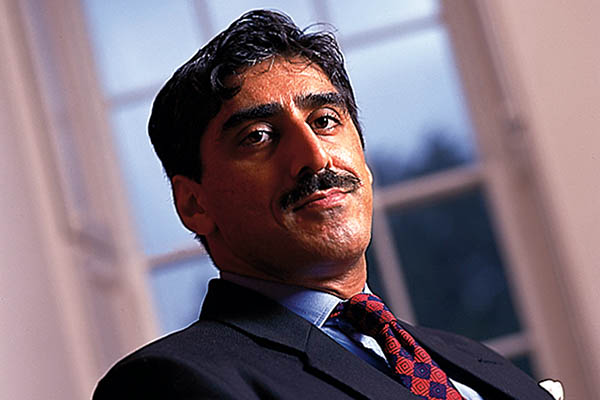
Courtesy of Khawar Qureshi QC
Khawar Qureshi QC on life as a leading U.K. Queen’s Counsel and the ‘Jadhav’ spy case
English barrister Khawar Qureshi, possessing the prestigious title of Queen’s Counsel, has undertaken hundreds of cases before courts in the United Kingdom at all levels for the U.K. Government and many other States. In addition, he has made frequent appearances before International Arbitral Tribunals across the world, acting or advising on matters involving around 70 different jurisdictions. He is currently representing Pakistan in its International Court of Justice case concerning Kulbushan Jadhav, who was convicted of spying for India and is linked to unrest at the behest of New Delhi’s spy agency.
In an exclusive and in depth conversation, Khawar Qureshi QC discusses his life as one of the U.K.’s leading Commercial and International Lawyers, and sheds light on the “Jadhav” case.
Firstly, many thanks for agreeing to speak to Newsweek. I understand you were very hesitant about any contact with the media?
As an English Barrister, I have undertaken many high-profile cases all over the world, and we rarely interact with the media.
However, it is a matter of concern and regret that a certain amount of falsity is now to be expected in this age of fake news. Even so, the false media reports relating to me, after a hearing before the International Court of Justice in the Jadhav case in May 2017, were shocking to many people. They were spread in India as well as Pakistan and in my 28 years of international practice I have never experienced such false—even malicious—reporting of that magnitude. This is a very negative phenomenon; in the era of fake news, mindless use of social media and the frenzied race for sensationalist coverage, the truth must never be left behind.
Can you tell us a little about yourself—you mentioned earlier that you were astonished to be told that one leading Pakistani politician had apparently described you as “Qatari Counsel” when in fact Q.C. means Queen’s Counsel
I was born and grew up in England, my parents being from Pakistan. I am hugely blessed to have parents whose example instilled within me a desire to always try to do what is right—however nasty and unpleasant the opposition.
In terms of my legal career, I have studied law at Cambridge University where I obtained a 1st class degree, and then qualified as a Barrister in 1990. I was very fortunate to do my pupillage training and be accepted as a Barrister in the renowned chambers of Lord Neill QC, who was the Vice-Chancellor of Oxford University. It was a privilege to learn from, and then to be invited to join, the chambers then described as “the intellectual powerhouse” of the English Bar.
From very early on in my career, I was able to undertake complex commercial litigation and international law matters against opponents much more senior to me. I very much enjoyed each new case as a challenge and opportunity to learn. During 1999-2006 I was appointed as an “A” Panel U.K. Government Treasury Counsel, which meant that I was one of 20 Barristers from a total of around 12,000 selected to advise and represent the U.K. Government. I became a Queen’s Counsel (QC) in 2006 and since then, through my offices Serle Court London and McNair Chambers Qatar, have continued to undertake legal work all over the world.
In addition, I taught Commercial Law part-time at Cambridge University, and then International Law at Kings College London and the London School of Economics. I was appointed a Visiting Professor in Commercial Law at London University in 2006. My passion for law was nurtured by people who taught me that the ideals of justice and the rule of law are achievable. I consider it my responsibility to teach when I can, in the hope that others can be inspired to believe, and to achieve.
I was appointed a Deputy High Court Judge in 2013 and a Bencher of Middle Temple in 2014. Until 2015, I was Chairman of TheCityUK Legal Services Group, which promoted the English Legal profession internationally as the lead organization designated by the U.K. Ministry of Justice. I led delegations involving U.K. government officials to many jurisdictions, and was asked to provide reports to the Senior Judiciary, as well as the legal profession, on issues affecting the English legal system such as improving the processes for Commercial Litigation and Arbitration in England & Wales.
Throughout my career, I have sought to share my passion for the law by writing legal articles regularly, as well as having authored books on International and Commercial law issues. I strongly believe that each of us can and must try to make a positive difference to the world we inhabit in whatever way is available to us. Throughout my career, I have also been involved in pro-bono work for charities, including legal advice work for UNICEF and being Chairman of Trustees of the International Charity War Child.
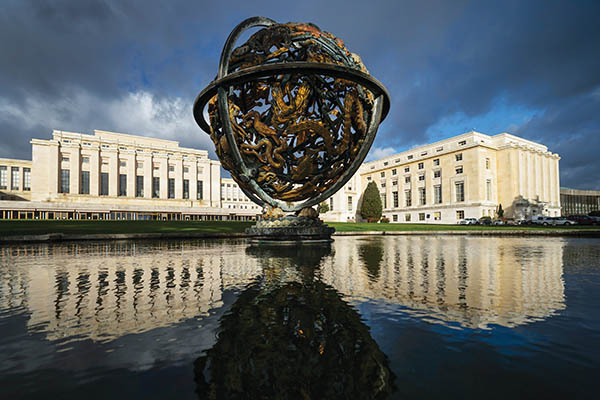
The U.N. building in Geneva, where Khawar Qureshi QC advised the OIC that they could use force to prevent the Srebrenica massacre. Fabrice Coffrini—AFP
What drives you?
How law serves the ends of fairness, achieving social justice, the vital nature of the Rule of Law and the importance of a sound legal as well as political system for the development of any society are matters that I care deeply about. Without justice and the rule of law, we have seen again and again that human beings wielding power appear to fall back to a default position of venality and tyranny. We all have a responsibility not to turn a blind eye to injustice.
Can you tell us a bit more about some of your cases?
As you know, lawyers are bound by strict rules of confidentiality, but I can certainly share some information which is in the public domain. In addition to the hundreds of cases for the U.K. Government and State bodies such as the Home Office, Foreign Office, Ministry of Defense, U.K. Serious Fraud Office, I have advised or acted on many complex commercial international matters involving more than 70 States, including the U.S., Russia, Italy, Kenya, Kazakhstan.
One situation will always stand out in my memory. The horrors of the mass killings of mainly Muslim civilians in Bosnia in the early 1990s presented (in my view) a disgraceful example of humanity looking the other way, as it has done so often. It was a test of my belief in International Law when, having been in practice for a couple of years, I was asked to advise and represent the Bosnian Government at the United Nations’ highest Court, the International Court of Justice in The Hague (the ICJ), against Serbia and Montenegro in the “Genocide case,” and thereafter act as legal adviser for the Bosnian Government at the Dayton Peace Talks in 1995. I will never forget how powerless and angry I felt in late July 1995, when I was asked to fly urgently to Geneva to brief the Organization of Islamic Conference Foreign Ministers, who were meeting on the eve of the Srebrenica massacre. It appeared to me (sadly), that they were no less indifferent than other world leaders to the near certain carnage that the Serb forces were about to inflict. They seemed unable or unwilling to act on my legal advice that they could legitimately use necessary and proportionate force, to prevent the imminent mass extermination of thousands of civilians. What happened after that is well known—the worst atrocity on European soil since the Second World War. The experience taught me how important it is for leaders to exercise power responsibly and in pursuit of justice, as well as what happens when the Rule of Law is trampled upon.
More recently, I have also advised and represented many other States on international law matters, but most are sensitive and not in the public domain.
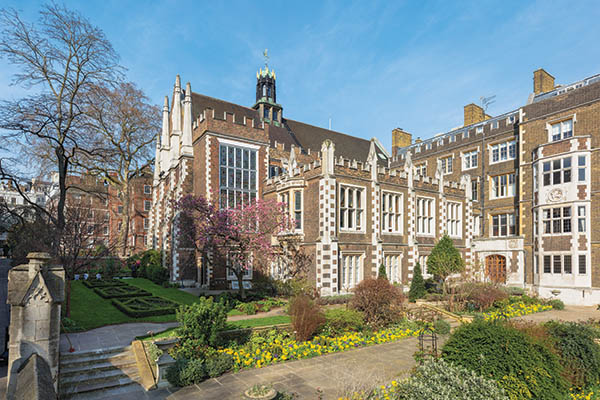
Middle Temple Hall, where Khawar Qureshi QC was appointed a Bencher in 2014. David Iliff
In the immediate aftermath of the ICJ’s order of May 18, 2017 in the “Jadhav” case, there was repeated reference in the Indian and some Pakistani media to you having advised and represented the Indian Government in the past. Is that allowed?
I have undertaken many cases for commercial parties from India, as well as acting for State entities such as Air India. I have also been Counsel for the Government of India (in what was then the largest claim brought against a State by General Electric, Enron and Bechtel—for around USD7 billion, concerning the “Dhabol” power plant). In fact, I was instructed by Mr. Milon Banerji, (the late Attorney General of India), to replace other English Barristers far more senior to me. It all worked out well; in the end, the Dhabol case was settled for a tiny fraction of the claimed amount.
What I understood you are asking me is—is it allowed for me to represent India and then Pakistan? In simple terms, so long as there is no information, which a Barrister obtains from a client that is used to benefit another client, there is no conflict of interest. So the answer is yes, it is allowed. In fact, I would go further than that; an English Barrister is ethically bound to accept instructions from a client if there is no conflict of interest issue. Indeed, I was recently told that I am the only lawyer ever to have represented India, and Pakistan, and acted in a matter between both States. I view this as a reflection of professionalism and trust above all else, which is the foundation of my work.
In truth, your question goes to the core of what an English Barrister’s role is all about. My role is not to stand in the shoes of the client, but to advance the best case for whichever client I am instructed to represent. I consider it a great honor and privilege to have been able to represent States and clients from across the Globe in very complex, and often sensitive cases.
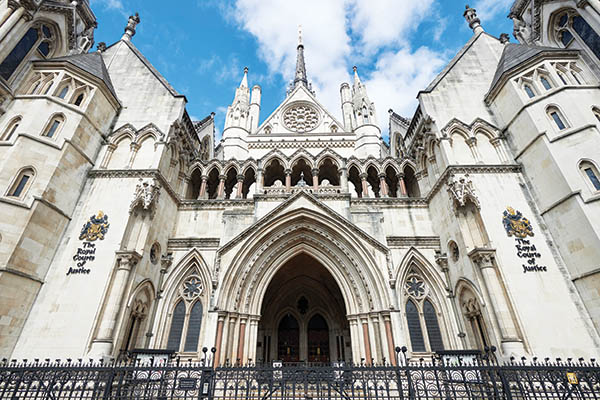
The Royal Courts of Justice, London, where Khawar Qureshi QC is a Deputy High Court Judge. Niklas Halle’n—AFP
You referred to frenzied and inaccurate social media and press coverage of the Jadhav case—what is the case about, what happened at the ICJ and what will happen going forwards?
I believe Pakistan’s position has been stated very publically since around March 2016, as well as the legal arguments I have raised in my oral and written submissions to the ICJ on May 15, 2017—so I will refer to them.
The basic outline is that in early March 2016, Commander Kulbhushan Jadhav was arrested in Balochistan, having clandestinely entered Pakistan from Iran. He was carrying an Indian passport in the name of “Hussein Mubarak Patel”—more about that later. Pakistan shared with the world at large his confession before a Magistrate as a serving Indian Navy Commander seconded to RAW (the Indian intelligence’s Research and Analysis Wing), who was involved in crimes of espionage and terrorism directed toward the infrastructure and people of Pakistan, including Gwadar port and CPEC [China-Pakistan Economic Corridor] facilities.
Jadhav was tried and convicted by a Military Court, which passed the death sentence on April 10, 2017. Clemency petition avenues are available under the Constitution of Pakistan as of right, as well as review by the High Court of Pakistan.
From March 25, 2016 onwards, India sought consular access to Jadhav, which was denied.
Both India and Pakistan signed the Vienna Convention on Consular Relations 1963 (VCCR). They also both signed a separate agreement giving jurisdiction to the ICJ.
On May 8, 2017, India made an application to the ICJ arguing that Pakistan had violated the VCCR by denying consular access, and that the Military Court trial/conviction was flagrantly unfair. India demanded that the ICJ should immediately make an order (without any hearing) that Pakistan should not execute Jadhav pending the full hearing of India’s claims.
It is very important to remember that even the High Court of Pakistan can order a stay of execution pending legal challenges (to preserve the status quo without making any decision on the facts or merits)—it has done so many times, often within hours of an application being made for a stay. India also demanded that, when the ICJ decides the case on its merits, the Court should “at least” order the “acquittal or release” of Jadhav. The ICJ unsurprisingly did order a stay of execution on May 18, 2017, pending the full hearing.
Since the ICJ hearing in May 2017, India filed its full pleading and I drafted Pakistan’s detailed Counter Memorial. Most unusually, India insisted on yet a further round of pleadings, and filed a Reply on April 17, 2018 to which Pakistan will shortly file its Rejoinder pleading in response.
Pakistan continues to press for an expedited hearing, and hopes the Court will make the time to hear and determine this matter without further delay.
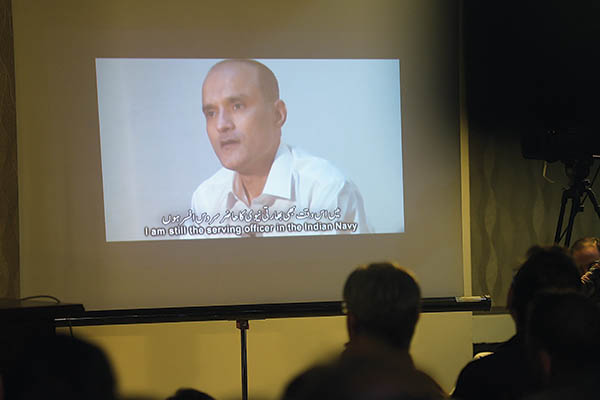
Kulbushan Jadhav’s confession is shown to journalists during a press conference in Islamabad, March 29, 2016. Aamir Qureshi—AFP
Some people suggested that Pakistan should never have appeared before the ICJ, or that you did not have enough time to prepare—because you could have used a full hour but spoke for less.
Both comments are unsound. Firstly, As a U.N. Member State, which has signed Treaties giving the ICJ jurisdiction, Pakistan like all responsible States must behave with dignity. It is very rare for a private litigant, never mind a State, to fail to appear before a Court. If nothing else, it sends out a negative signal.
As for my appearance at the Court, as a member of the English Bar, we believe—as with most aspects of life—that it is quality not quantity that matters. I have argued hundreds of matters before many different Courts and Arbitral Tribunals. I was instructed by Pakistan on May 12, traveled to Pakistan and then appeared before the ICJ on May 15, 2017. The ICJ did order a stay of execution on May 18, 2017, but, as I explained, that should not have surprised anyone.
Within the time available to me, I was able to prepare detailed written arguments and identify the key arguments against India. More than a year later, India (with respect) has still not addressed those arguments, and there has been no credible suggestion that I had failed to identify any key facts or arguments during the oral hearing on May 15, 2017.
Nevertheless the huge headlines were “India wins”; “Pakistan lost”, when nothing could be further from the truth. A simple reading of Paragraph 60 of the ICJ order makes the following clear;
“60. The decision given in the present proceedings in no way prejudges the question of the jurisdiction of the Court to deal with the merits of the case or any questions relating to the admissibility of the Application or to the merits themselves. It leaves unaffected the right of the Governments of India and Pakistan to submit arguments in respect of those questions.” (emphasis added)
Absurd suggestions were being projected as “fact” or “exclusive news,” with ridiculous and ever expanding fee figures being attributed to me, no doubt to stoke controversy (if not increasing envy, albeit misplaced, amongst lawyers!). In addition, my London office and I were on the receiving end of cyber-attacks, as well as malicious and threatening e-mails/websites. These are all rather pathetic tactics, which no doubt were intended to intimidate and create misunderstandings. It is a pity the media and social media embraced such nonsense as fact.
Can you headline some of the key arguments for our readers?
As I mentioned earlier, the full facts and legal arguments are very detailed, but I will summarize some of the key points.
India says Jadhav recently retired from the Indian Navy (but not when or why), and suggests he was kidnapped from Iran and smuggled into Pakistan to extract a false confession. India says the entire legal process against him in Pakistan was unfair, and demands that the ICJ “at least” orders his acquittal or release. India says Jadhav should have been given immediate consular access.
Pakistan says Jadhav was a Naval Commander who was working for RAW when arrested. The ICJ has been asked to consider whether individuals suspected of espionage had in practice often been excluded from the right to consular access—an argument never raised or considered previously. The ICJ has now exceptionally invited all States that signed the VCCR to respond to Pakistan’s argument on this point, which is based upon the material practice of the U.S., Soviet Union and China, including the famous Gary Powers case (given the Hollywood treatment in The Bridge of Spies), as well as commentaries from experts in this field.
In addition, India and Pakistan signed an express agreement on Consular Access in 2008 (at the suggestion of India), which clearly qualifies consular access in situations involving issues of security—consistent with the State practice I mentioned. I was told that some “expert” commentators in the media had suggested I never referred to the 2008 Agreement during the May 15, 2017 hearing. If they had watched the live broadcast or read the transcript they would have seen I quoted it in full, and explained why it applied, so as to flag up Pakistan’s key arguments on the merits for the future. As the Court made clear in paragraph 60 of its Order, it was not considering the substantive arguments on May 15, 2017 in any event—it was solely concerned to preserve the status quo.
The ICJ has also been asked to consider whether India has behaved illegally by providing Jadhav with an authentic Indian passport in the name of “Hussein Mubarak Patel.” A very eminent U.K. expert has provided evidence that Jadhav used this passport at least 17 times to come into and out of India. He confirmed that the passport was issued by Indian authorities. The inference is that India gave Jadhav the false Muslim identity for improper purposes. India’s answer has been to say it does not need to answer this point.
The “Passport Issue” has recently also been raised by respected Indian journalists Praveen Swami and Karan Thapar. They have been accused of spreading “propaganda” and, sadly, also been called “traitors” for doing their job as professional journalists. No real answer has been given on this point, as well as most of the other arguments—apart (with respect) from resort to “spin.”
World-renowned U.K. Military Law experts have given expert evidence concerning Pakistan’s Military Courts system, with reference to the Military Courts in the U.K., U.S., India and other key jurisdictions. They have confirmed that effective review of the decisions of Pakistan’s Military Courts is potentially available before the High Court of Pakistan.
I submitted on May 15, 2017 and repeat, the ICJ has never ordered “acquittal or release” (as India “at least” seeks), and all its previous decisions indicate it would never do so.
It is an honor to represent Pakistan in this matter and, God willing, I will continue to do so to the best of my ability
From the July 14 – 21, 2018 issue

1 comment
Barrister Khawar Qureshi’s devotion to fairness and equity is remarkable and praiseworthy.